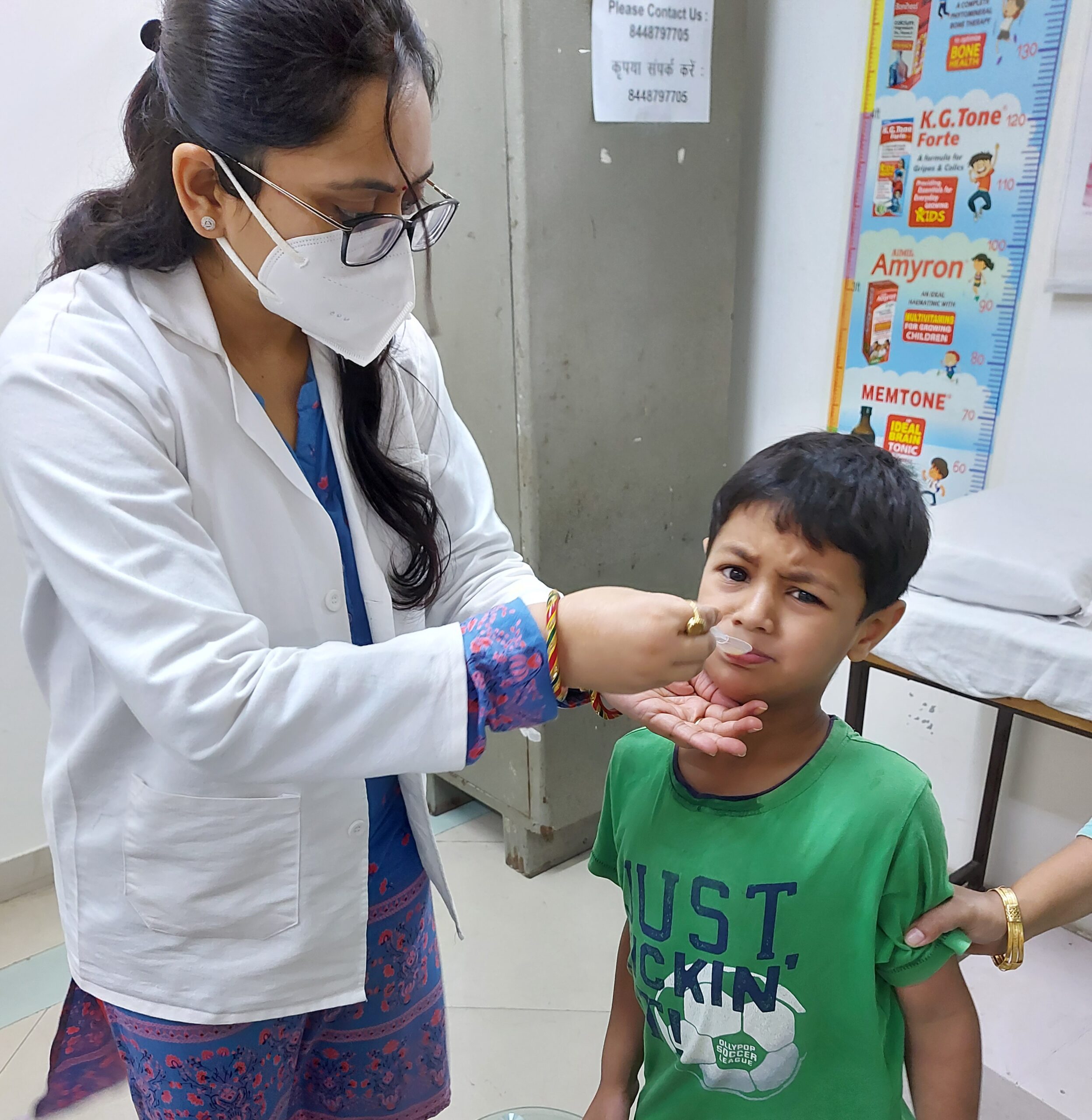ADHD in Children
ADHD in Children, or Attention Deficit Hyperactivity Disorder, is a neurodevelopmental disorder characterized by persistent patterns of inattention, hyperactivity, and impulsivity that significantly impair daily functioning and quality of life.
It affects individuals of all ages, but symptoms often manifest during childhood and can persist into adulthood. Understanding the complexities of Attention Deficit Hyperactivity Disorder is crucial for proper diagnosis, treatment, and support.


Types of ADHD in Children
Inattentive Type
Individuals with the inattentive type of ADHD often struggle with sustaining attention, following instructions, and organizing tasks. They may appear forgetful and easily distracted, leading to difficulties in academic and professional settings.
Hyperactive-Impulsive Type
Hyperactive-impulsive ADHD presents with symptoms such as excessive fidgeting, restlessness, and difficulty remaining seated. Impulsivity may manifest as speaking out of turn, interrupting others, and engaging in risky behaviors without considering consequences.
Combined Type
Combined ADHD involves a combination of inattentive, hyperactive, and impulsive symptoms, making it the most common presentation of the disorder. Individuals with combined type ADHD experience challenges across multiple domains of functioning.
Causes and Risk Factors
- The exact cause of ADHD remains unclear, but research suggests a combination of genetic, environmental, and neurobiological factors contribute to its development.
- Genetic predisposition plays a significant role, with heritability estimates ranging from 70% to 80%.
- Environmental influences such as prenatal exposure to toxins, premature birth, and childhood trauma may also increase the risk of developing ADHD.


Symptoms of ADHD
Inattention Symptoms
Symptoms of inattention include difficulty sustaining focus, frequent careless mistakes, poor organization, forgetfulness, and trouble following through on tasks or instructions.
Hyperactivity Symptoms
Hyperactivity symptoms involve excessive motor activity, restlessness, difficulty engaging in quiet activities, and a constant need for movement or stimulation.
Impulsivity Symptoms
Impulsivity manifests as acting without forethought, difficulty waiting one’s turn, blurting out answers, interrupting conversations, and engaging in risky behaviors.
Diagnosis of ADHD in Children
- Diagnosing ADHD involves a comprehensive evaluation process that considers medical history, behavioral observations, and symptom severity.
- Criteria outlined in the Diagnostic and Statistical Manual of Mental Disorders (DSM-5) guide clinicians in making an accurate diagnosis, which often requires input from multiple sources, including parents, teachers, and mental health professionals.
Treatment Options
1.Medication
Stimulant medications such as methylphenidate and amphetamine derivatives are commonly prescribed to manage ADHD in children by increasing neurotransmitter levels in the brain. Non-stimulant medications like atomoxetine and guanfacine may also be effective, particularly for individuals who do not respond well to stimulants or experience significant side effects.
2.Behavioral Therapy
Behavioral interventions, such as cognitive-behavioral therapy (CBT) and behavior modification techniques, aim to improve self-regulation, impulse control, and coping skills. These approaches can be particularly beneficial when combined with medication management.
3.Parental Education and Support
Educating parents about ADHD and providing strategies for managing symptoms at home are essential components of treatment. Parent training programs focus on behavior management techniques, communication strategies, and fostering a supportive home environment.
Managing ADHD
Lifestyle Adjustments
Implementing routines, setting up organizational systems, maintaining a balanced diet, ensuring adequate sleep, and incorporating regular physical activity can help mitigate ADHD symptoms and improve overall well-being.
School Accommodations
School-based interventions may include individualized education plans (IEPs), classroom accommodations, preferential seating, extended time on assignments or tests, and access to support services such as tutoring or counseling.
Support Groups
Joining support groups or online communities can provide individuals with ADHD and their families with valuable peer support, practical advice, and a sense of belonging.
Impact of ADHD In Children
Academic Challenges
ADHD can significantly impact academic performance due to difficulties with concentration, time management, organization, and impulsivity. Academic support and accommodations can help mitigate these challenges and promote academic success.
Social and Emotional Impact
Individuals with ADHD may experience social difficulties, including trouble making and maintaining friendships, as well as emotional dysregulation, such as mood swings, frustration, and low self-esteem. Building social skills and fostering emotional resilience are crucial for navigating interpersonal relationships.
Long-Term Outcomes
Untreated or poorly managed ADHD can have long-term consequences, including academic underachievement, employment difficulties, substance abuse, and mental health issues such as depression and anxiety. Early intervention and ongoing support can improve long-term outcomes and quality of life.




Myths and Misconceptions
Attention Deficit Hyperactivity Disorder as a Character Flaw
ADHD is often misunderstood as laziness, lack of intelligence, or a character flaw rather than a neurobiological condition. Dispelling these misconceptions requires education and raising awareness about the biological basis of ADHD and its impact on daily functioning.
Overdiagnosis Concerns
While Attention Deficit Hyperactivity Disorder diagnoses have increased in recent years, concerns about overdiagnosis and inappropriate medication use persist. Proper assessment by qualified professionals and consideration of alternative explanations for symptoms are essential to avoid misdiagnosis and ensure appropriate treatment.
Alternative Treatments
While medication and behavioral therapy are considered first-line treatments for ADHD, alternative approaches such as dietary changes, supplements, and neurofeedback have gained popularity. However, evidence supporting their efficacy remains limited, and individuals should approach alternative treatments with caution and
Support for Individuals with Attention Deficit Hyperactivity Disorder
Family Support
Family members play a crucial role in supporting individuals with ADHD by providing understanding, encouragement, and practical assistance. Open communication, empathy, and collaboration are key in navigating the challenges associated with ADHD together as a family unit.
Educational Resources
Accessing reliable educational resources, such as books, websites, and support organizations dedicated to ADHD, can provide valuable information, tips, and strategies for managing symptoms, advocating for accommodations, and fostering success in academic and professional settings.
Advocacy Organizations
Connecting with advocacy organizations, such as CHADD (Children and Adults with Attention Deficit Hyperactivity Disorder) and ADDA (Attention Deficit Disorder Association), can offer advocacy support, community engagement opportunities, and access to resources for individuals with ADHD and their families.
Research and Developments
Recent advancements in ADHD research have led to a deeper understanding of the underlying neurobiology and neurochemistry of the disorder, as well as innovative approaches to treatment and intervention. Ongoing research initiatives focus on identifying biomarkers, exploring novel therapeutic targets, and developing personalized treatment strategies tailored to individual needs.
Adult Attention Deficit Hyperactivity Disorder
While ADHD is commonly associated with childhood, it can persist into adulthood and present unique challenges in various life domains, including work, relationships, and self-esteem. Recognizing and addressing ADHD symptoms in adulthood requires comprehensive assessment, appropriate treatment, and support services tailored to the specific needs of adults with ADHD.
Addressing Stigma
Combatting stigma associated with ADHD involves promoting accurate information, challenging stereotypes, and fostering empathy and understanding within society. Education campaigns, public awareness initiatives, and advocacy efforts aimed at destigmatizing ADHD can promote acceptance and inclusivity for individuals with the disorder.
Conclusion
In conclusion, ADHD is a complex neurodevelopmental disorder that affects individuals across the lifespan, impacting various aspects of daily functioning and quality of life. Understanding the different types, causes, symptoms, diagnosis, and treatment options for ADHD is essential for effectively managing the condition and supporting individuals affected by it. By dispelling myths, advocating for awareness, and promoting access to resources and support services, we can create a more inclusive and supportive environment for individuals with ADHD.
FAQs (Frequently Asked Questions)
- Is Attention Deficit Hyperactivity Disorder a real disorder, or is it just an excuse for poor behavior?
ADHD is a legitimate neurodevelopmental disorder supported by extensive research and clinical evidence. It is not simply a behavioral issue or a character flaw but rather a complex condition that affects brain function and behavior. - Can adults develop Attention Deficit Hyperactivity Disorder later in life, or is it only diagnosed in childhood?
While ADHD often manifests in childhood, it can persist into adulthood or develop later in life. Diagnosis in adults may be more challenging due to overlapping symptoms with other mental health conditions, but appropriate assessment and treatment are still possible. - Are medications the only treatment option for ADHD, or are there alternatives?
Medication is one of several treatment options for ADHD, but it is not the only approach. Behavioral therapy, lifestyle adjustments, and support services also play important roles in managing symptoms and improving functioning. - Is Attention Deficit Hyperactivity Disorder overdiagnosed, leading to unnecessary medication use?
While concerns about overdiagnosis exist, proper assessment by qualified professionals using standardized criteria is essential for accurate diagnosis. Medication should only be prescribed when symptoms significantly impair functioning and other interventions have been considered. - Can individuals with Attention Deficit Hyperactivity Disorder lead successful lives, or does the disorder always hinder their abilities?
With appropriate support, understanding, and accommodations, individuals with ADHD can lead fulfilling and successful lives. Many people with ADHD excel in their chosen fields, utilizing their unique strengths and talents to overcome challenges and achieve their goals.






